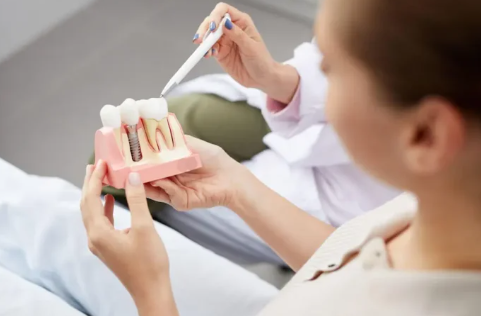Dental implants
A dental implant is a small titanium post that is surgically inserted into the jawbone to replace the root of a missing tooth. Once the implant is in place, a crown is attached to the top of the post, creating a prosthetic tooth that blends seamlessly with the surrounding teeth.Dental implant infection
Dental implant infection, also known as peri-implantitis, is an infection that occurs in the tissues surrounding the dental implant. It can develop at any time after the implant surgery, but it is most common within the first few weeks to months. If left untreated, dental implant infection can lead to implant failure and other oral health complications.
Several factors can contribute to the development of dental implant infection. Poor oral hygiene is a significant risk factor, as bacteria can accumulate around the implant site and cause infection. Smoking, diabetes, immunodeficiency disorders, poorly placed implants, inadequate bone support, and the condition of the mouth at the time of surgery can also increase the risk of infection.
Prevention is key when it comes to dental implant infection. Maintaining good oral hygiene by brushing and flossing regularly, quitting smoking, and managing any underlying health conditions such as diabetes are essential steps. It is also important to choose a qualified and experienced implant dentist and follow their post-operative instructions diligently.
Symptoms of dental implant infection
The symptoms of dental implant infection can vary from person to person. Some common signs include pain or discomfort around the implant site, swelling or inflammation, redness or tenderness, bleeding or discharge, bad taste or odor in the mouth, and in some cases, fever or chills.Several factors can contribute to the development of dental implant infection. Poor oral hygiene is a significant risk factor, as bacteria can accumulate around the implant site and cause infection. Smoking, diabetes, immunodeficiency disorders, poorly placed implants, inadequate bone support, and the condition of the mouth at the time of surgery can also increase the risk of infection.
Diagnose a dental implant infection
To diagnose a dental implant infection, your dentist will conduct a thorough oral examination and may order imaging tests such as X-rays or CT scans. They may also take a sample of the fluid around the implant site for testing.Treatment for dental implant infection
Treatment for dental implant infection typically involves a combination of antibiotics to eliminate the infection and, in some cases, removal of the implant if the infection is severe. Your dentist may also recommend deep cleaning of the implant site or other procedures to promote healing.Prevention is key when it comes to dental implant infection. Maintaining good oral hygiene by brushing and flossing regularly, quitting smoking, and managing any underlying health conditions such as diabetes are essential steps. It is also important to choose a qualified and experienced implant dentist and follow their post-operative instructions diligently.
Complications of dental implant infection
Complications of dental implant infection can include implant failure, bone loss around the implant, and other oral health problems. In rare cases, the infection can spread and cause serious systemic infections.conclusion
In conclusion, dental implant infection is a significant concern that can lead to implant failure and other oral health complications. Being aware of the symptoms, risk factors, and preventive measures is crucial. If you suspect you have a dental implant infection, it is important to seek prompt treatment from your dentist. By maintaining good oral hygiene, quitting smoking, and following your dentist's instructions, you can reduce the risk of infection and enjoy the benefits of dental implants for many years.
FAQs
Can dental implant infection occur immediately after surgery?
While dental implant infection can occur at any time after surgery, it is more common within the first few weeks to months after the procedure. Proper care and adherence to post-operative instructions can help reduce the risk of infection during this critical period.
Is dental implant infection common?
Dental implant infection is considered a rare complication, but it can occur. The risk of infection can vary depending on factors such as oral hygiene, overall health, and the expertise of the implant dentist. Following proper oral care practices and regular dental check-ups can help minimize the risk of infection.
Can antibiotics prevent dental implant infection?
Antibiotics may be prescribed before or after dental implant surgery to prevent infection in some cases. However, the routine use of antibiotics is not always necessary, and it is best to follow your dentist's recommendations based on your individual situation.
Can dental implant infection lead to implant failure?
Yes, if left untreated, dental implant infection can lead to implant failure. The infection can compromise the stability and integration of the implant with the jawbone, resulting in the need for implant removal and additional treatment.
Is it possible to save an infected dental implant?
In some cases, infected dental implants can be saved through appropriate treatment. This may involve a combination of antibiotics, deep cleaning of the implant site, removal of any infected tissue, and possible replacement of the implant components. Early detection and prompt intervention increase the chances of saving the implant.
Can I get a dental implant if I have a history of infections?
The decision to proceed with dental implant surgery depends on various factors, including the severity and frequency of past infections, the overall health of the patient, and the recommendations of the dental implant specialist. Your dentist will evaluate your specific situation and determine the most appropriate course of action.



0 Comments